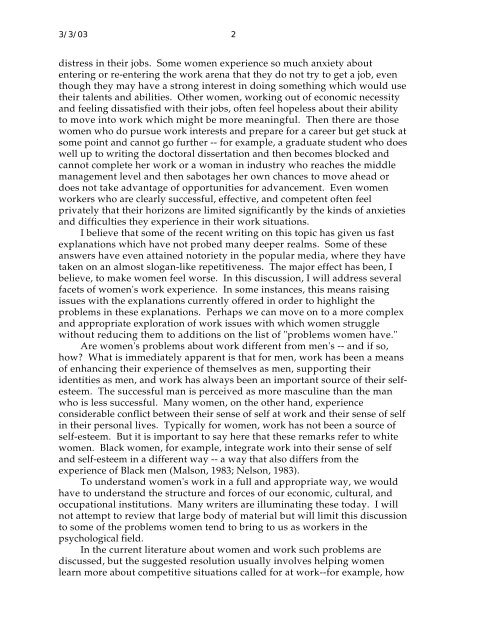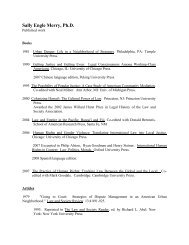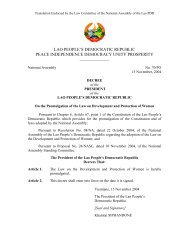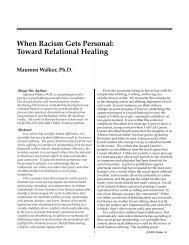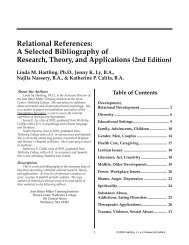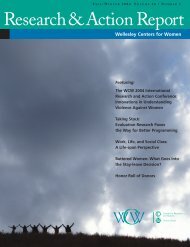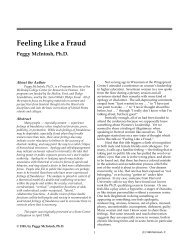Work Inhibitions in Women Irene P. Stiver, Ph.D. About the Speaker ...
Work Inhibitions in Women Irene P. Stiver, Ph.D. About the Speaker ...
Work Inhibitions in Women Irene P. Stiver, Ph.D. About the Speaker ...
Create successful ePaper yourself
Turn your PDF publications into a flip-book with our unique Google optimized e-Paper software.
3/3/03 2<br />
distress <strong>in</strong> <strong>the</strong>ir jobs. Some women experience so much anxiety about<br />
enter<strong>in</strong>g or re-enter<strong>in</strong>g <strong>the</strong> work arena that <strong>the</strong>y do not try to get a job, even<br />
though <strong>the</strong>y may have a strong <strong>in</strong>terest <strong>in</strong> do<strong>in</strong>g someth<strong>in</strong>g which would use<br />
<strong>the</strong>ir talents and abilities. O<strong>the</strong>r women, work<strong>in</strong>g out of economic necessity<br />
and feel<strong>in</strong>g dissatisfied with <strong>the</strong>ir jobs, often feel hopeless about <strong>the</strong>ir ability<br />
to move <strong>in</strong>to work which might be more mean<strong>in</strong>gful. Then <strong>the</strong>re are those<br />
women who do pursue work <strong>in</strong>terests and prepare for a career but get stuck at<br />
some po<strong>in</strong>t and cannot go fur<strong>the</strong>r -- for example, a graduate student who does<br />
well up to writ<strong>in</strong>g <strong>the</strong> doctoral dissertation and <strong>the</strong>n becomes blocked and<br />
cannot complete her work or a woman <strong>in</strong> <strong>in</strong>dustry who reaches <strong>the</strong> middle<br />
management level and <strong>the</strong>n sabotages her own chances to move ahead or<br />
does not take advantage of opportunities for advancement. Even women<br />
workers who are clearly successful, effective, and competent often feel<br />
privately that <strong>the</strong>ir horizons are limited significantly by <strong>the</strong> k<strong>in</strong>ds of anxieties<br />
and difficulties <strong>the</strong>y experience <strong>in</strong> <strong>the</strong>ir work situations.<br />
I believe that some of <strong>the</strong> recent writ<strong>in</strong>g on this topic has given us fast<br />
explanations which have not probed many deeper realms. Some of <strong>the</strong>se<br />
answers have even atta<strong>in</strong>ed notoriety <strong>in</strong> <strong>the</strong> popular media, where <strong>the</strong>y have<br />
taken on an almost slogan-like repetitiveness. The major effect has been, I<br />
believe, to make women feel worse. In this discussion, I will address several<br />
facets of women's work experience. In some <strong>in</strong>stances, this means rais<strong>in</strong>g<br />
issues with <strong>the</strong> explanations currently offered <strong>in</strong> order to highlight <strong>the</strong><br />
problems <strong>in</strong> <strong>the</strong>se explanations. Perhaps we can move on to a more complex<br />
and appropriate exploration of work issues with which women struggle<br />
without reduc<strong>in</strong>g <strong>the</strong>m to additions on <strong>the</strong> list of "problems women have."<br />
Are women's problems about work different from men's -- and if so,<br />
how What is immediately apparent is that for men, work has been a means<br />
of enhanc<strong>in</strong>g <strong>the</strong>ir experience of <strong>the</strong>mselves as men, support<strong>in</strong>g <strong>the</strong>ir<br />
identities as men, and work has always been an important source of <strong>the</strong>ir selfesteem.<br />
The successful man is perceived as more mascul<strong>in</strong>e than <strong>the</strong> man<br />
who is less successful. Many women, on <strong>the</strong> o<strong>the</strong>r hand, experience<br />
considerable conflict between <strong>the</strong>ir sense of self at work and <strong>the</strong>ir sense of self<br />
<strong>in</strong> <strong>the</strong>ir personal lives. Typically for women, work has not been a source of<br />
self-esteem. But it is important to say here that <strong>the</strong>se remarks refer to white<br />
women. Black women, for example, <strong>in</strong>tegrate work <strong>in</strong>to <strong>the</strong>ir sense of self<br />
and self-esteem <strong>in</strong> a different way -- a way that also differs from <strong>the</strong><br />
experience of Black men (Malson, 1983; Nelson, 1983).<br />
To understand women's work <strong>in</strong> a full and appropriate way, we would<br />
have to understand <strong>the</strong> structure and forces of our economic, cultural, and<br />
occupational <strong>in</strong>stitutions. Many writers are illum<strong>in</strong>at<strong>in</strong>g <strong>the</strong>se today. I will<br />
not attempt to review that large body of material but will limit this discussion<br />
to some of <strong>the</strong> problems women tend to br<strong>in</strong>g to us as workers <strong>in</strong> <strong>the</strong><br />
psychological field.<br />
In <strong>the</strong> current literature about women and work such problems are<br />
discussed, but <strong>the</strong> suggested resolution usually <strong>in</strong>volves help<strong>in</strong>g women<br />
learn more about competitive situations called for at work--for example, how


